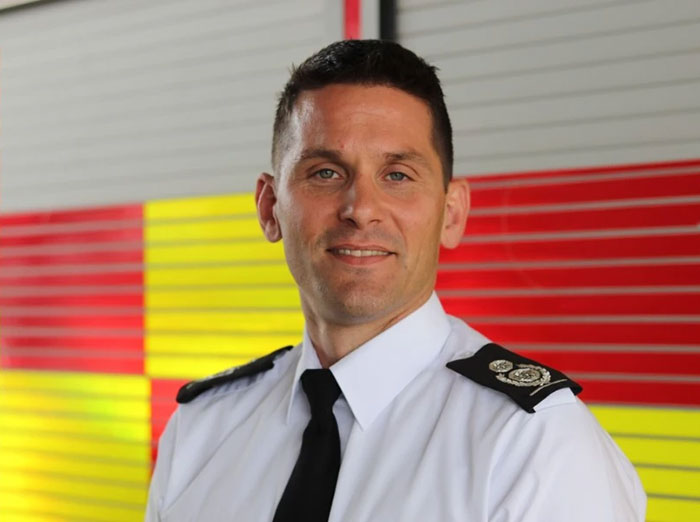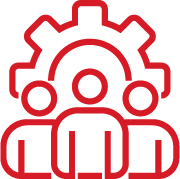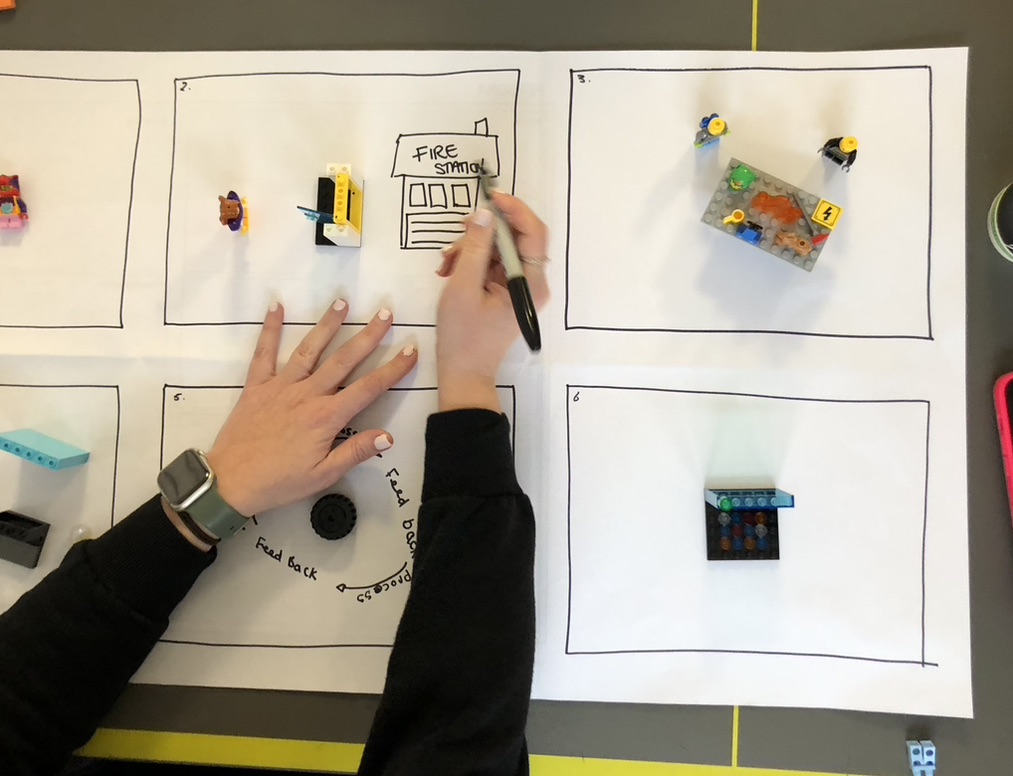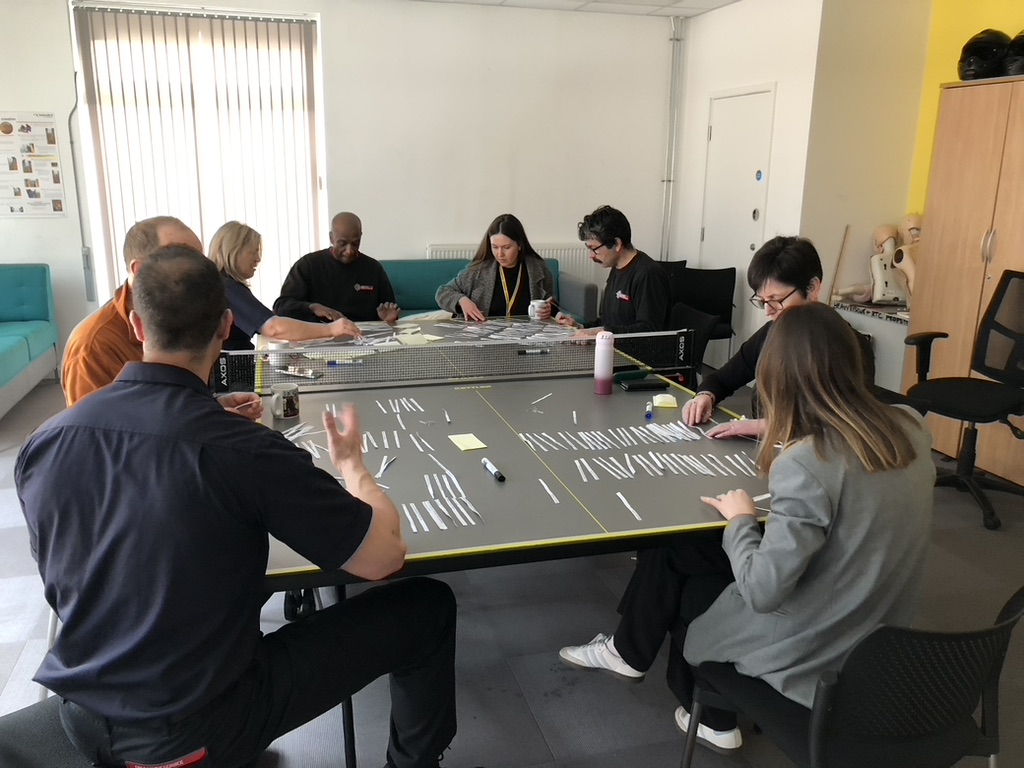Foreword from Chief Fire Officer, Matt Cook

At the heart of everything we do is a clear and unwavering commitment to provide the highest standard and best value service to the community. Our mission guides us – to improve public safety through prevention, protection, response and resilience. We are here to serve, to be there when needed most, to reduce risk and to improve the quality of life for our community. This strategy reflects our ambition to make our diverse communities safer and healthier, while ensuring the Service is a great place to work where everyone feels valued, supported, and empowered to achieve their full potential.
We know that the challenges ahead will demand courage, collaboration, and accountability. That is why we are committed to working together as a team, delivering high-quality, value for money services that meet the evolving needs of our communities. Reflecting the purpose within the National Fire Chiefs’ Council (NFCC) People, Culture and Leadership Strategic Plan, culture matters now more than ever, because we have an opportunity to build on what’s working, whilst actively addressing challenges, gaps and inconsistencies that are holding our people back.
This strategy is anchored in how people experience work, not just systems and compliance but also leadership behaviour, psychological safety, collaboration and how values show up day to day. In this document, we will outline current insight that has directed the plan, designed around real people, through continuous feedback and co-creation of solutions. The outcomes of which will build on the recommendations from His Majesty’s Inspectorate of Constabulary and Fire & Rescue Services (HMICFRS) findings and our Service Plan.
The cost of standing still is too high. If we fail to act with intention, we risk reinforcing the very barriers that limit our people and weaken our service to the public.
We will create a culture where every person learns and reflects. People will have the right support, skills, training and development to do their jobs well and feel confident in their contribution. Our people’s experiences will be shaped by trust, shared learning, and a clear sense of purpose, identity and belonging.
When our people feel proud of how we work together, it directly strengthens our community. A strong, inclusive, and values-led culture doesn’t just benefit our people: it powers the service that our communities rely on and deserve.
This is more than a strategy. It’s a promise – to the public, and to each other.
Key achievements 2024-25
In 2024, we developed a one-year People Services Strategy focused on integrating the new operating model and its associated themes that were, insight, collaborative working, great people and innovation. During this year we also focused on our delivering of our HMICFRS recommendations and wider Service Plan actions.
We have worked across a number of teams to deliver on these actions and have a lot to be proud of, including:
Where we are now
Our key achievements show that the organisation is making meaningful strides to shape a healthier, more inclusive culture. The growth of our ICARE allies and our continued focus to reform old processes such as recruitment and selection will continue to have a major impact moving forward.
Our latest insights, gathered through the annual Touchpoint Survey give us a clear view of what it’s like to work at Avon Fire & Rescue Service. Many teams report a strong connection and pride in serving the community. We are also seeing a cultural
shift that more people are feeling that their views are respected. This sense of belonging is a real strength to build on.
We also heard a lot about clarity and direction. Some colleagues feel confident in where we are heading, while others are unsure or feel communication could be more consistent.
There was less feedback about how much freedom people feel in their roles, which may mean it’s not an area currently front of mind or could be an area we need to explore more deeply.
Concerns were raised around fairness and recognition. Some colleagues feel that decisions are not always transparent, or that contributions are not equally valued. They show us where trust needs to be strengthened and where we must ensure that everyone feels seen and respected.
Furthermore, we have recently carried out a maturity model mapping exercise with the NFCC which found we are making progress towards a more inclusive and values-led culture, but some maturity gaps remain. We’re now developing new ways of working to celebrate success and share learning from improvement work, at the same time reviewing how we use data to inform cultural development.
Finally, the mapping identified the need to place greater emphasis on embedding our values in our performance reviews, training and governance.
This insight, mapping and ongoing discovery in our culture capture and future mapping tells us what matters most to our people, and where we need to focus to create a service where everyone can thrive.
Strategic priorities
Our pillars are in line with the NFCC People, Culture and Leadership Strategic Plan, and utilises a people-first approach, one that focuses on lived experience, values-led leadership, and how our culture is felt day to day.

1. People: Empowered, Engaged and Accountable
We are creating conditions where people thrive by investing in clear processes, accessible systems and meaningful support. This includes enabling self-service, improving policies, and strengthening how our people experience work.
Focus on: fair and consistent processes, clarity of expectations, access to support, and accountability at every level.
Why it matters: when people are trusted and equipped to do their best at work, they feel valued and take ownership.
How will we do this: improve access to tools and guidance, streamlined systems, enhance employee voice, and embed accountability into day to day work.
We will build clarity around roles and expectations, and support people to grow the skills and behaviours needed to succeed.
2. Leadership and Workforce Development
We are developing leadership at all levels that builds trust, fosters a culture of continuous learning, and consistently models the values and behaviour we want to see across the organisation.
Focus on: emotional intelligence, psychological safety, and clarity of purpose.
Why it matters: leadership sets the tone. Sustainable change is not achieved through direction alone; it must be demonstrated. People take their cues from leadership. Change must be modelled, not mandated.
How will we do this: brave conversations, humility in leadership, coaching and mentoring, talent management, feedback culture, values and behaviours led approach personal development reviews, leadership planning, culture of learning, transparent development processes, reward and recognition.
We will ensure our people have the right knowledge, skills and behaviours to fulfil their roles with confidence and integrity, aligned with professional standards, our values and Core Code of Ethics.
3. Cultural Connection and Equity
We are embedding a shared culture rooted in respect, inclusion, and lived experience. This means aligning what we say with what we do and ensuring everyone feels part of something bigger.
Focus on: shared values, belonging, equity, lived experience, representation and inclusive every day actions.
Why it matters: when culture is shared and inclusive, trust grows, collaboration strengthens, and people are more likely to stay and contribute fully.
How will we do this: culture mapping, regular insight from surveys and culture chats, inclusive decision making, recruit a more diverse workforce, leadership development for those in underrepresented groups, allyship, staff networks, community engagement, inclusive decision making, people impact assessments shaping inclusive policies and processes. We’ll work closely with NFCC and colleagues to shape culture together.
4. Health, Wellbeing and Resilience
We are designing work and systems that support wellbeing, fitness, growth, and positive working life.
Focus on: autonomy at work, personal growth, emotional and physical health.
Why it matters: people perform best when they feel well, valued and supported, and psychologically safe.
How will we do this: clear direction for our people, a mental health action plan, offering tailored fitness and wellbeing support, digitised people toolkits, work-life balance, and celebrating our successes.
Our pillars show we are committed to aligning with the national frameworks and Fire Standards to strengthen collaboration, embed consistent standards, and promote inclusive, values-led leadership. Through shared tools, proven frameworks, and a focus on competence, we will build a culture where everyone can thrive and contribute with confidence.
Key shifts we need to make
Under our four themes we are progressing on many of the themes and projects, however through the insight we have received we are aware of four focus areas and enablers which will require key shifts we need to make over the course of this strategy.
 1. Strengthen insight and decision making
1. Strengthen insight and decision making
We will improve data, and use insights from our people and communities so individuals and managers can make informed, timely decisions and ensure the Service is fit for the future.
 2. Build trust through fair and transparent processes
2. Build trust through fair and transparent processes
We will ensure our systems and decision-making processes are experienced as fair, inclusive, and consistent, so that everyone feels seen, respected, and confident in how the organisation operates.
 3. Create clarity and shared direction
3. Create clarity and shared direction
We will provide a clear, consistent narrative about the cultural journey, helping people understand where we are heading, why it matters, and how their work contributes to the impact we want to have in our community.
 4. Empower and equip middle management as change enablers
4. Empower and equip middle management as change enablers
We will actively engage middle managers by giving them tools, support, and trust they need to lead cultural change locally. Their role will be evaluated for implementers to co-creators of the strategy, ensuring alignment and ownership at all levels.
How we get there

To bring this strategy to life we will focus on how people actually experience work. This means we are not implementing through static plans, but we are designing our culture and the systems and processes that have an effect on that culture intentionally, through capturing insight and co-creating systems.
We will use a design thinking mindset to shape culture intentionally, we will shape culture through being led by insight, co-creation and continuous learning. This is not a one-off exercise, we are not just making small tweaks, we are aiming for real change. It’s an ongoing way of working that invites everybody to play a role in shaping the future of our Service, including the communities we serve.

We are taking a people-led, design informed approach to shaping culture. This means we will:
Start with lived experience – understanding our people, levels of trust and psychological safety will guide and deliver change.
Use insight to focus our efforts – we will draw on colleagues’ feedback, dashboards, community perception, and national frameworks to understand what matters most.
Work with people, not just for them – co-creation and inclusive design will be built into how we shape systems and experiences.
Learn and adapt as we go – this strategy is a living document. We will test, learn and adjust our approach. Our culture is something that we will nurture and develop over time.
To support this, we will use the Culture Design Canvas to map where we are, where we want to be and how to get there. This includes:
- Core behaviours
- Decision-making norms
- Feedback and learning loops
- Symbols and rituals
- Psychological safety
We are looking to build a future-fit culture so our insights will be from both our colleagues and our communities.
We will stay focused on what matters the most, stay organised and keep things moving forward.
Initial discovery and insight work will take place over a number of months. However, the methodology involving – and approach of being led by – insight and lived experience and co-designing solutions will be used for all people-focused projects, although the level of involvement may vary depending on project size and complexity.
What success looks like
Under our four pillars:
Next steps
The specific Key Performance Indicators (KPI’s) and priorities will come in the supporting plan, informed by the insights, culture mapping and HMICFRS recommendations.
The work programmes and projects that underpin the delivery of the majority of this strategy predominantly sit within the new People Services Department under the Service Delivery Support directorate, but of course culture change is owned by all of us and will be an entirely collaborative journey. We all have a part to play. Team plans and delivery schedules are being developed to support this work, in
conjunction with the Project Management Office and this will be shared with the Service Leadership Team. The necessary governance processes will apply depending on whether the work package, project programme. We will be continuously consulting with our People Services leaders and key stakeholders, utilising the expertise of our external partner agencies and seeking specialist insight along the way.
This is a living strategy. We will continuously gather feedback, test our ideas and adjust our approach based on what we learn. Our commitment is not just to say the right things in a strategy, but to build a culture our people are proud to be part of.
Our focus is to now gather feedback, make improvements, and involve people more and more over time.
Appendix
Employee Relations & Pensions
Providing trusted guidance on employment matters, performance, case management, and pensions, ensuring staff are treated fairly, equitably, and in accordance with legislation and policy.
Inclusion
Championing inclusion across all areas of the Service, supporting a culture where everyone feels safe, respected, and empowered to be their authentic selves. Ensuring our policies, culture, and practices reflect and serve the diversity of our workforce and the communities we support.
Wellbeing & Fitness
Promoting a proactive, holistic approach to physical, mental, and emotional wellbeing, helping our people to maintain resilience and fitness for role, both at work and beyond.
Workforce Development
Supporting career growth, leadership development, and lifelong learning, equipping staff with the skills, knowledge, and confidence to succeed and progress at every stage of their career. To ensure a diverse, capable, and future-ready workforce aligned with the needs of Avon Fire & Rescue Service and the communities we serve. Ensuring fair, transparent, and effective employment practices.